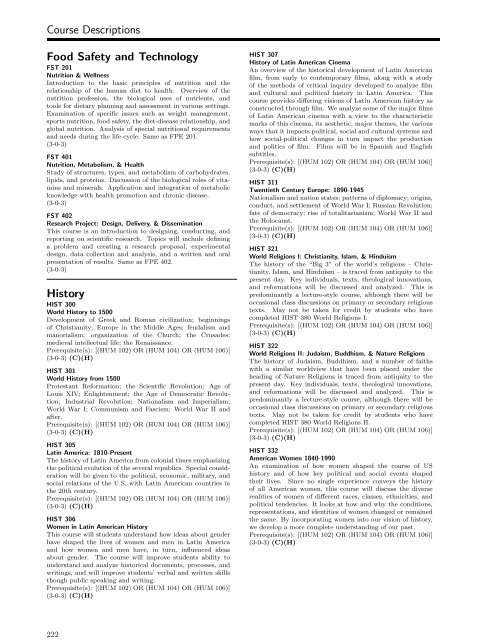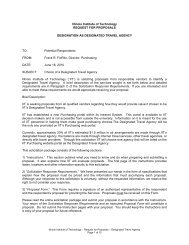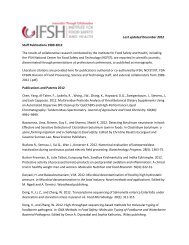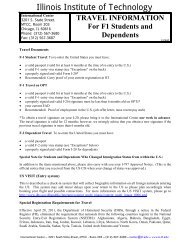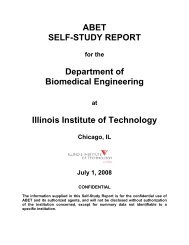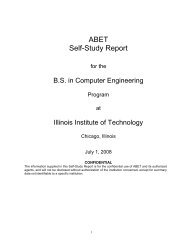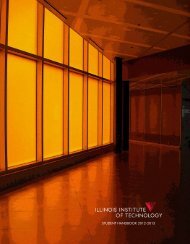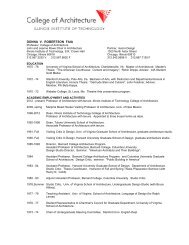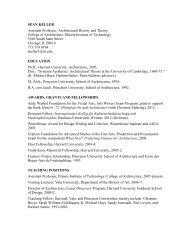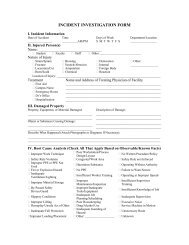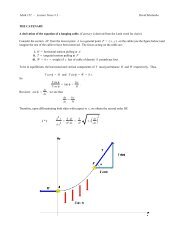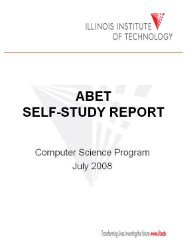Undergraduate Bulletin - Illinois Institute of Technology
Undergraduate Bulletin - Illinois Institute of Technology
Undergraduate Bulletin - Illinois Institute of Technology
Create successful ePaper yourself
Turn your PDF publications into a flip-book with our unique Google optimized e-Paper software.
Course Descriptions<br />
Food Safety and <strong>Technology</strong><br />
FST 201<br />
Nutrition & Wellness<br />
Introduction to the basic principles <strong>of</strong> nutrition and the<br />
relationship <strong>of</strong> the human diet to health. Overview <strong>of</strong> the<br />
nutrition pr<strong>of</strong>ession, the biological uses <strong>of</strong> nutrients, and<br />
tools for dietary planning and assessment in various settings.<br />
Examination <strong>of</strong> specific issues such as weight management,<br />
sports nutrition, food safety, the diet-disease relationship, and<br />
global nutrition. Analysis <strong>of</strong> special nutritional requirements<br />
and needs during the life cycle. Same as FPE 201.<br />
(3-0-3)<br />
FST 401<br />
Nutrition, Metabolism, & Health<br />
Study <strong>of</strong> structures, types, and metabolism <strong>of</strong> carbohydrates,<br />
lipids, and proteins. Discussion <strong>of</strong> the biological roles <strong>of</strong> vitamins<br />
and minerals. Application and integration <strong>of</strong> metabolic<br />
knowledge with health promotion and chronic disease.<br />
(3-0-3)<br />
FST 402<br />
Research Project: Design, Delivery, & Dissemination<br />
This course is an introduction to designing, conducting, and<br />
reporting on scientific research. Topics will include defining<br />
a problem and creating a research proposal, experimental<br />
design, data collection and analysis, and a written and oral<br />
presentation <strong>of</strong> results. Same as FPE 402.<br />
(3-0-3)<br />
History<br />
HIST 300<br />
World History to 1500<br />
Development <strong>of</strong> Greek and Roman civilization; beginnings<br />
<strong>of</strong> Christianity; Europe in the Middle Ages; feudalism and<br />
manorialism; organization <strong>of</strong> the Church; the Crusades;<br />
medieval intellectual life; the Renaissance.<br />
Prerequisite(s): [(HUM 102) OR (HUM 104) OR (HUM 106)]<br />
(3-0-3) (C)(H)<br />
HIST 301<br />
World History from 1500<br />
Protestant Reformation; the Scientific Revolution; Age <strong>of</strong><br />
Louis XIV; Enlightenment; the Age <strong>of</strong> Democratic Revolution;<br />
Industrial Revolution; Nationalism and Imperialism;<br />
World War I; Communism and Fascism; World War II and<br />
after.<br />
Prerequisite(s): [(HUM 102) OR (HUM 104) OR (HUM 106)]<br />
(3-0-3) (C)(H)<br />
HIST 305<br />
Latin America: 1810-Present<br />
The history <strong>of</strong> Latin America from colonial times emphasizing<br />
the political evolution <strong>of</strong> the several republics. Special consideration<br />
will be given to the political, economic, military, and<br />
social relations <strong>of</strong> the U.S. with Latin American countries in<br />
the 20th century.<br />
Prerequisite(s): [(HUM 102) OR (HUM 104) OR (HUM 106)]<br />
(3-0-3) (C)(H)<br />
HIST 306<br />
Women in Latin American History<br />
This course will students understand how ideas about gender<br />
have shaped the lives <strong>of</strong> women and men in Latin America<br />
and how women and men have, in turn, influenced ideas<br />
about gender. The course will improve students ability to<br />
understand and analyze historical documents, processes, and<br />
writings, and will improve students’ verbal and written skills<br />
though public speaking and writing.<br />
Prerequisite(s): [(HUM 102) OR (HUM 104) OR (HUM 106)]<br />
(3-0-3) (C)(H)<br />
HIST 307<br />
History <strong>of</strong> Latin American Cinema<br />
An overview <strong>of</strong> the historical development <strong>of</strong> Latin American<br />
film, from early to contemporary films, along with a study<br />
<strong>of</strong> the methods <strong>of</strong> critical inquiry developed to analyze film<br />
and cultural and political history in Latin America. This<br />
course provides differing visions <strong>of</strong> Latin American history as<br />
constructed through film. We analyze some <strong>of</strong> the major films<br />
<strong>of</strong> Latin American cinema with a view to the characteristic<br />
marks <strong>of</strong> this cinema, its aesthetic, major themes, the various<br />
ways that it impacts political, social and cultural systems and<br />
how social-political changes in turn impact the production<br />
and politics <strong>of</strong> film. Films will be in Spanish and English<br />
subtitles.<br />
Prerequisite(s): [(HUM 102) OR (HUM 104) OR (HUM 106)]<br />
(3-0-3) (C)(H)<br />
HIST 311<br />
Twentieth Century Europe: 1890-1945<br />
Nationalism and nation states; patterns <strong>of</strong> diplomacy; origins,<br />
conduct, and settlement <strong>of</strong> World War I; Russian Revolution;<br />
fate <strong>of</strong> democracy; rise <strong>of</strong> totalitarianism; World War II and<br />
the Holocaust.<br />
Prerequisite(s): [(HUM 102) OR (HUM 104) OR (HUM 106)]<br />
(3-0-3) (C)(H)<br />
HIST 321<br />
World Religions I: Christianity, Islam, & Hinduism<br />
The history <strong>of</strong> the “Big 3” <strong>of</strong> the world’s religions – Christianity,<br />
Islam, and Hinduism – is traced from antiquity to the<br />
present day. Key individuals, texts, theological innovations,<br />
and reformations will be discussed and analyzed. This is<br />
predominantly a lecture-style course, although there will be<br />
occasional class discussions on primary or secondary religious<br />
texts. May not be taken for credit by students who have<br />
completed HIST 380 World Religions I.<br />
Prerequisite(s): [(HUM 102) OR (HUM 104) OR (HUM 106)]<br />
(3-0-3) (C)(H)<br />
HIST 322<br />
World Religions II: Judaism, Buddhism, & Nature Religions<br />
The history <strong>of</strong> Judaism, Buddhism, and a number <strong>of</strong> faiths<br />
with a similar worldview that have been placed under the<br />
heading <strong>of</strong> Nature Religions is traced from antiquity to the<br />
present day. Key individuals, texts, theological innovations,<br />
and reformations will be discussed and analyzed. This is<br />
predominantly a lecture-style course, although there will be<br />
occasional class discussions on primary or secondary religious<br />
texts. May not be taken for credit by students who have<br />
completed HIST 380 World Religions II.<br />
Prerequisite(s): [(HUM 102) OR (HUM 104) OR (HUM 106)]<br />
(3-0-3) (C)(H)<br />
HIST 332<br />
American Women 1840-1990<br />
An examination <strong>of</strong> how women shaped the course <strong>of</strong> US<br />
history and <strong>of</strong> how key political and social events shaped<br />
their lives. Since no single experience conveys the history<br />
<strong>of</strong> all American women, this course will discuss the diverse<br />
realities <strong>of</strong> women <strong>of</strong> different races, classes, ethnicities, and<br />
political tendencies. It looks at how and why the conditions,<br />
representations, and identities <strong>of</strong> women changed or remained<br />
the same. By incorporating women into our vision <strong>of</strong> history,<br />
we develop a more complete understanding <strong>of</strong> our past.<br />
Prerequisite(s): [(HUM 102) OR (HUM 104) OR (HUM 106)]<br />
(3-0-3) (C)(H)<br />
222


